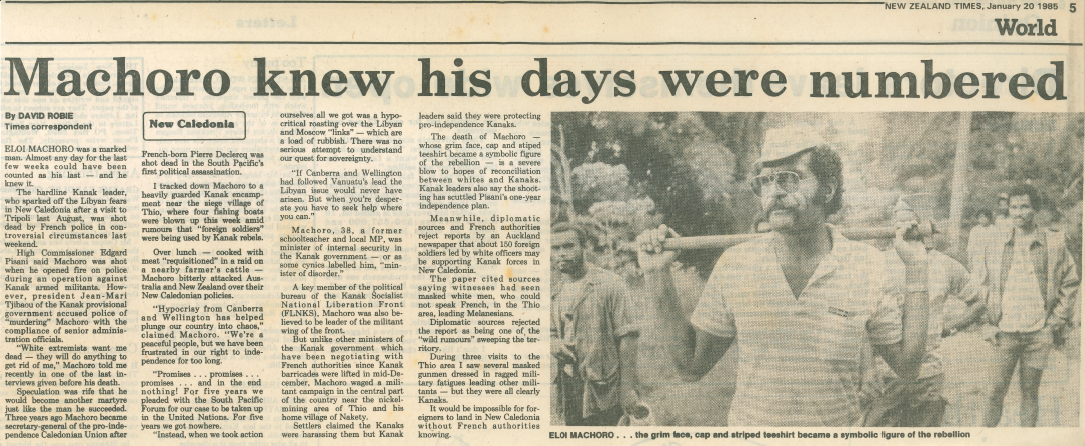By David Robie in the New Zealand Times
Éloi Machoro was a marked man. Almost any day for the last few weeks could have been counted as his last — and he knew it.
The hardline Kanak leader, who sparked off the Libyan fears in New Caledonia after a visit to Tripoli last August, was shot dead by French police in controversial circumstances last weekend.
High Commissioner Edgard Pisani said Machoro was shot when he opened fire on police during an operation against armed Kanak militants. However, president Jean-Marie Tjibaou of the Kanak provisional government accused police of “murdering” Machoro with the compliance of senior administration officials.
“White extremists want me dead — they will do anything to get rid of me,” Machoro told me recently in one of the last interviews before his death.
Speculation was rife that he would become another martyr just like the man he succeeded. Three years ago Machoro became secretary-general of the pro-independence Caledonian Union after French-born Pierre Declercq was shot dead in the South Pacific’s first political assassination.
I tracked down Machoro to a heavily guarded Kanak encampment near the siege village of Thio, where four fishing boats were blown up this week amid rumours that “foreign soldiers” were being used by Kanak rebels.
Over lunch — cooked with meat “requisitioned” in a raid on a nearby farmer’s cattle stock — Machoro bitterly criticised Australia and New Zealand over their policies about New Caledonia.
“Hypocrisy from Canberra and Wellington has helped plunge our country into chaos,” claimed Machoro. “We’re a peaceful people, but we have been frustrated in our right to independence for too long.
“Promises . . . promises . . . promises . . . and in the end nothing! For five years we pleaded with the South Pacific Forum for our case to be taken uo in the United Nations. For five years we got nowhere.
“Instead, when we took action ourselves all we got was a hypocritical roasting over the Libyan and Moscow ‘links’ — which are a load of rubbish. There was no serious attempt to undersgand our quest for sovereignty.
“if Canberra and Wellington had followed Vanuatu’s lead the Libyan issue would never have arisen. But when you’re desperate you have to seek help where you can.”
Machoro, 38, a former schoolteacher and local MP, was Minister of Internal Security in the Kanak government — or as some cynics labelled him, “minister of disorder”.
A key member of the political bureau of the Kanak and Socialist National Liberation Front (FLNKS), Machoro was also believed to be leader of the militant wing of the front.
But unlike other ministers of the Kanak government who have been negotiating with French authorities since Kanak barricades were lifted in mid-December, Machoro waged a militant campaign in the central part pf the country near the nickel-mining area of Thio and his home village of Nakety.
Settlers claimed the Kanaks were harassing them but Kanak leaders said they were protecting pro-independence Kanaks.
The death of Machoro — whose grim face, cap and striped tee-shirt became a symbolic figure of the rebellion — is a severe blow to hopes of reconciliation between whites and Kanaks. Kanak leaders also say the shooting has scuttled Pisani’s one-year independence plan.
Meanwhile, diplomatic sources and French authorities reject reports by an Auckland newspaper that about 150 foreign soldiers led by white officers may be supporting Kanak forces in New Caledonia.
The newspaper cited sources saying witnesses had seen masked white men, who could not speak French, in the Thio area, leading Melanesians.
Diplomatic sources rejected the report as being part of the “wild rumours” sweeping the territory.
During three visits to the Thio area I saw several masked men dressed in ragged military fatigues leading other militants — but they were all clearly Kanaks.
It would be impossible for foreigners to land in New Caledonia without French authorities knowing.


